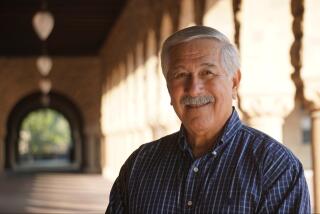Reconciling His Many Selves : THE POETRY OF HEALING by Rafael Campo; W.W. Norton $23, 270 pages
“I want you to know something about me, about us, after you finish reading this,” writes Rafael Campo, hopefully, but this is not what compels a reader through “The Poetry of Healing.” It is not the epiphanies, it is not the efforts to reconcile the doctor with the poet with the gay man with the Latino. We are a little jaded (or sophisticated) here in Los Angeles. People reconcile disparate parts 24 frames per second in this town.
It’s something old-fashioned and literary, something reminiscent of Chekhov (also a doctor), something reminiscent of Kafka’s “The Penal Colony” that distinguishes this book. It’s the way language comes up out of the body, like a fifth humor, bubbling up from daily life, bruises, wounds; and doctors, let’s face it, have a corner on this intimacy.
Much of this memoir describes Campo’s agony--as a child and as an adult--in his efforts to fit in. Like many big achievers, Campo chooses particularly high castle walls to scale. In high school, he fights with the truth of his gayness, in the schoolyard and in the Catholic Church: “I was the degenerate homosexual,” he writes, “whom I imagined my church so despised.” He fights his attraction to poetry, choosing premed studies, just as he fights his attraction to men. “Though poetry might try to seduce me with the most base and primitive charms of its thudding rhythms and emotional chants, I was actively resisting its pull, aspiring to elevate myself instead to the diaphanous plane of science.”
In choosing a college, he is drawn to only the most exclusive and homogeneous: “In spite of myself I have always wanted to enter the dependable squares of New England,” he writes, describing his acceptance to Amherst.
There is a charming scene in which Campo’s parents take him up to Amherst for orientation. His father scans the crowd for young Latino men and tries to drag them to his son, who finally orders him to stop (but only after some sixth sense of the father’s has fished the one man, Jorge Arroyo, from the crowd who will later become Campo’s first male lover). But this humorous story stands out amid the painful striving that marks Campo’s behavior at Amherst and later at Harvard Medical School.
It is when the language of modern medicine threatens Campo’s poetic nature, the healing prayers of his youth, that he makes his true commitment to poetry. He describes, in medical school, “a strange and unsatisfying relationship to language I did not expect. The healthy impulse to look inside was for a time corrupted by insiderliness. . . . I desperately wanted to learn the inner language of the human body.”
With the help of his patients, particularly patients with AIDS, Dr. Campo does learn that language, reconciling medicine and poetry as two attempts to give structure and formality to life’s blood and guts and chaos. “I have always been in love with the muscularity of formal verse,” he writes, in a phrase that combines all his ostensibly separate identities.
“The Poetry of Healing” describes Campo’s own healing, which means that we see him as we might through a split-image camera, trying to bring the man into focus. In the end, I care less about who Campo wants to be, fitting in to this institution or that, than who he actually is, disgusted, aroused, talented.
More to Read
Sign up for our Book Club newsletter
Get the latest news, events and more from the Los Angeles Times Book Club, and help us get L.A. reading and talking.
You may occasionally receive promotional content from the Los Angeles Times.







